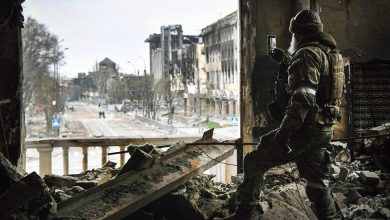Rwandan Court Declines to Extend Sentence for Paul Rusesabagina

NAIROBI, Kenya — A court in Rwanda on Monday turned away an attempt by prosecutors to extend the 25-year sentence for Paul Rusesabagina, the hotelier turned dissident whose story was portrayed in the Oscar-nominated movie “Hotel Rwanda,” to life in prison.
Mr. Rusesabagina was convicted in September on charges including murder, kidnapping and belonging to a terrorist group in a legal case that has been widely condemned by human-rights groups.
He had refused to participate in the appeal trial, denouncing it as fraudulent, after prosecutors said the sentences he and 20 others had received were too lenient. But in the end, the court ruled against the prosecution, finding that the current sentence was “in accordance with the weight of his crimes” as a first-time offender.
Kate Gibson, Mr. Rusesabagina’s legal counsel, said the decision was of a little solace. “What we are seeing is just the end of a long process of a sham trial so the number itself isn’t really of significance,” she said.
Yolande Makolo, the Rwandan government spokeswoman, did not immediately respond to a request for comment.
The verdict in the appeal is unlikely to have any practical effect, because Mr. Rusesabagina is likely to spend the rest of his life in prison — he is 67 years old, has survived cancer and has cardiovascular issues. His family has said that his health has continued to deteriorate in prison and that he does not have access to proper health care.
“Whether he gets a life sentence or 25 years is so far from our focus,” Ms. Gibson said, “We are thinking about: Is he going to be alive tomorrow, is he going to be alive at the end of the week?”
Human-rights groups and Mr. Rusesabagina’s family said the authorities had brought the case to punish him for standing up to the government of President Paul Kagame, who has clamped down on dissent in Rwanda since taking office even as he helped it recover from the 1994 genocide.
Mr. Rusesabagina and his lawyers also said that his rights to confidential communication and his ability to prepare his defense while he was in jail were repeatedly violated. In a video inadvertently sent to Al Jazeera English last February, Rwanda’s then-attorney general and justice minister, Johnston Busingye, admitted intercepting privileged material in Mr. Rusesabagina’s case.
A Belgian citizen and a permanent U.S. resident, Mr. Rusesabagina was lauded for his role in saving 1,268 people during the 1994 genocide. That story eventually became the basis for the 2004 movie “Hotel Rwanda” and brought Mr. Rusesabagina widespread fame and numerous humanitarian and civil rights awards, including a Presidential Medal of Freedom in 2005 from President George W. Bush.
Mr. Rusesabagina was living in exile in San Antonio, having moved his family there from Belgium because of concerns about his family’s safety after their house was burgled several times following his emergence as Mr. Kagame’s most high-profile critic.
In August 2020, he was lured by Rwandan operatives into leaving his home and traveling to Dubai, in the United Arab Emirates, before boarding a private jet that eventually delivered him to the Rwandan capital, Kigali.
Mr. Rusesabagina has said he was blindfolded and arrested immediately after he landed in Rwanda and, during his first days in detention, was held in solitary confinement and tortured.
Mr. Rusesabagina’s subsequent trial and detention was condemned by various human-rights groups, the European Parliament and members of the U.S. Congress.
Earlier this year, Human Rights Watch said it had monitored trials in Rwanda in 2020 and 2021 in which the “judicial authorities pursued politically motivated prosecutions and perpetuated a culture of intolerance of dissent.”
That was followed by a report from the United Nations Working Group on Arbitrary Detention published last month that concluded that the Rwandan government had abducted and arbitrarily held Mr. Rusesabagina, and it called for his immediate and unconditional release.
On Monday, before the verdict was announced, the Clooney Foundation for Justice, which has monitored the legal proceedings, also released its final report on the case against Mr. Rusesabagina, saying it was “seriously flawed” and breached international and regional fair trial standards.
Jean-Pierre Afadhali and Emma Bubola contributed reporting.





